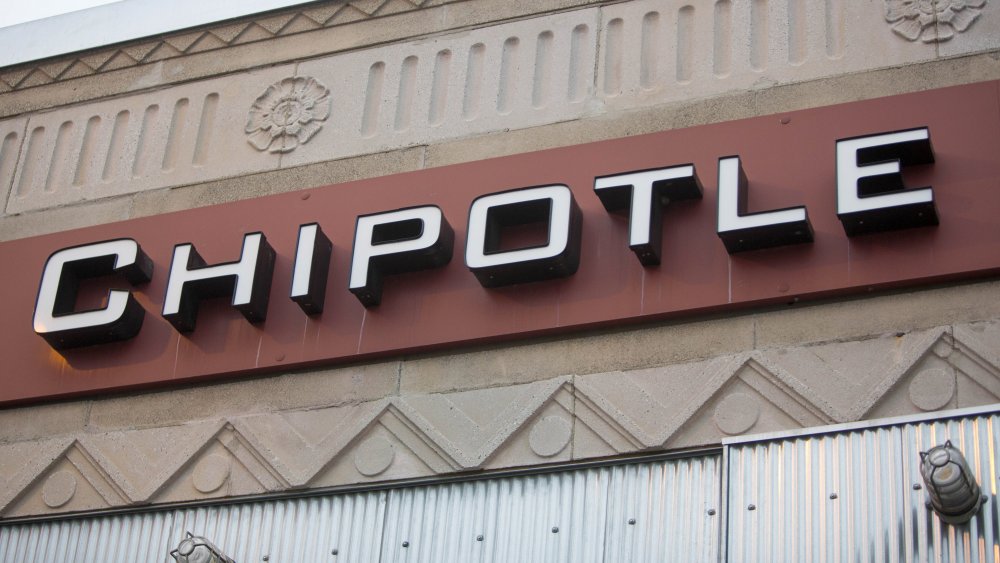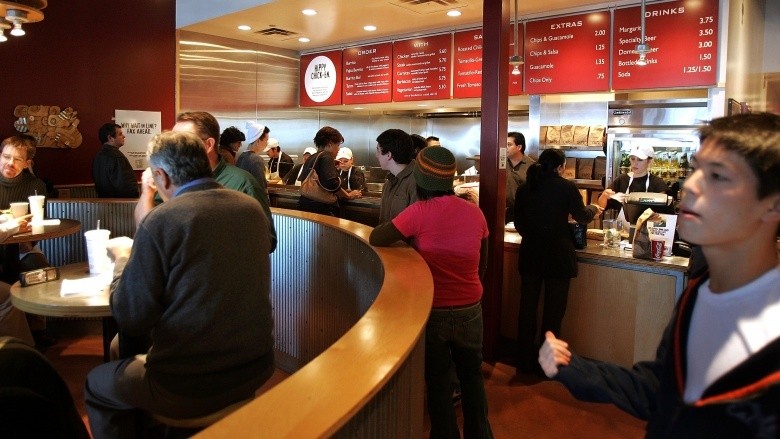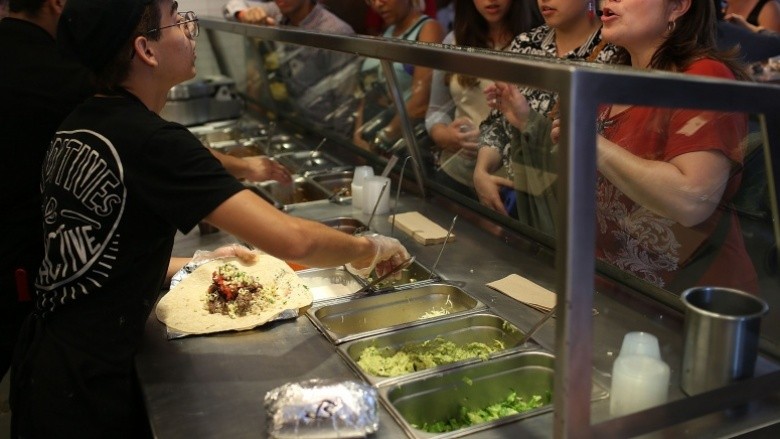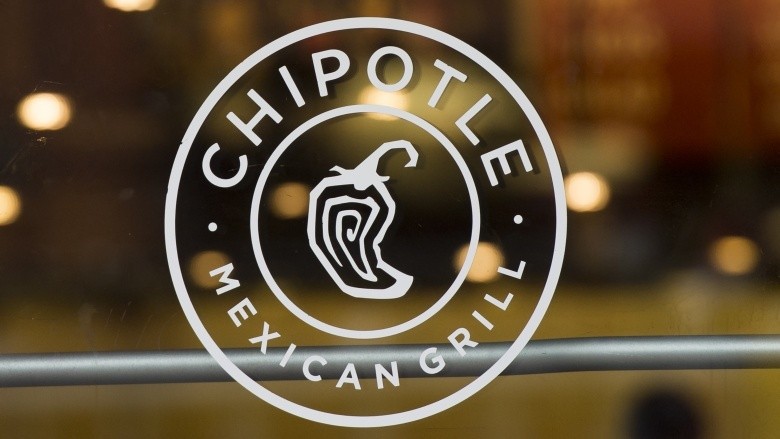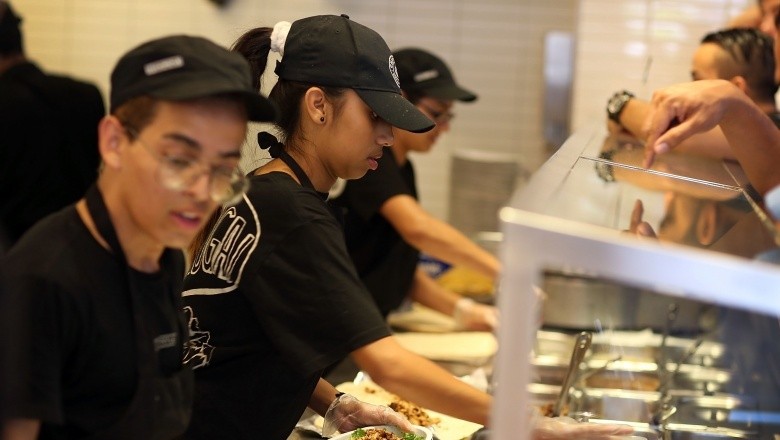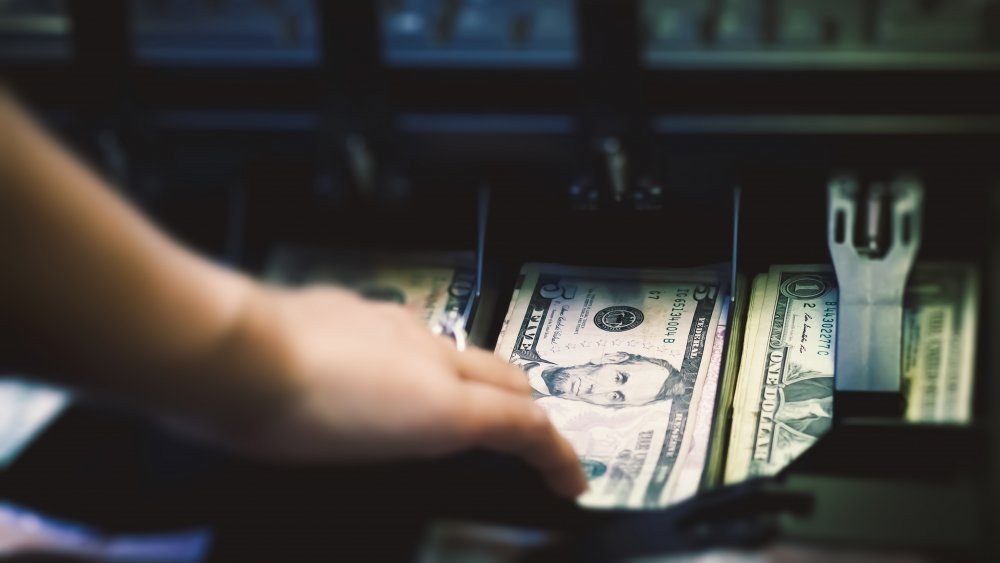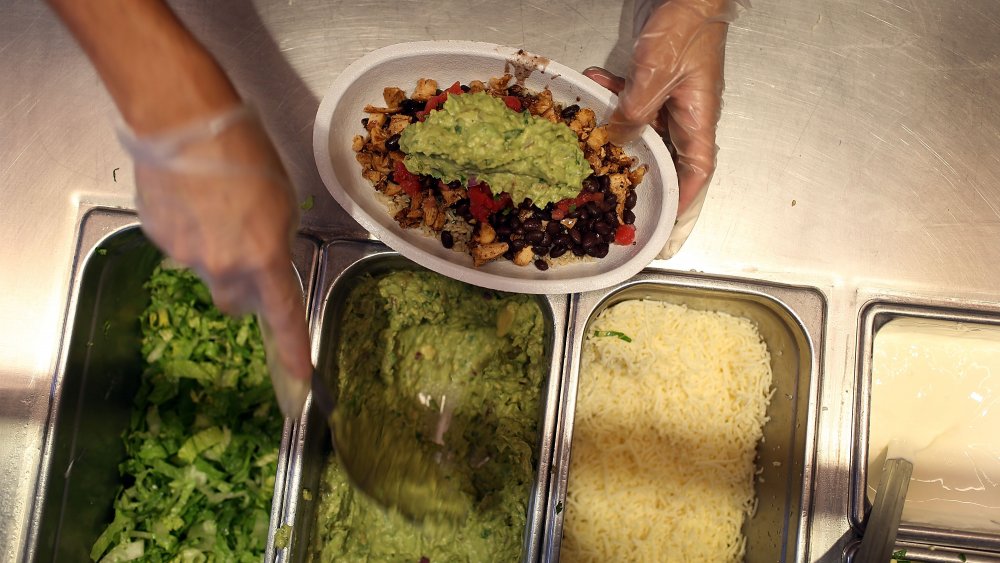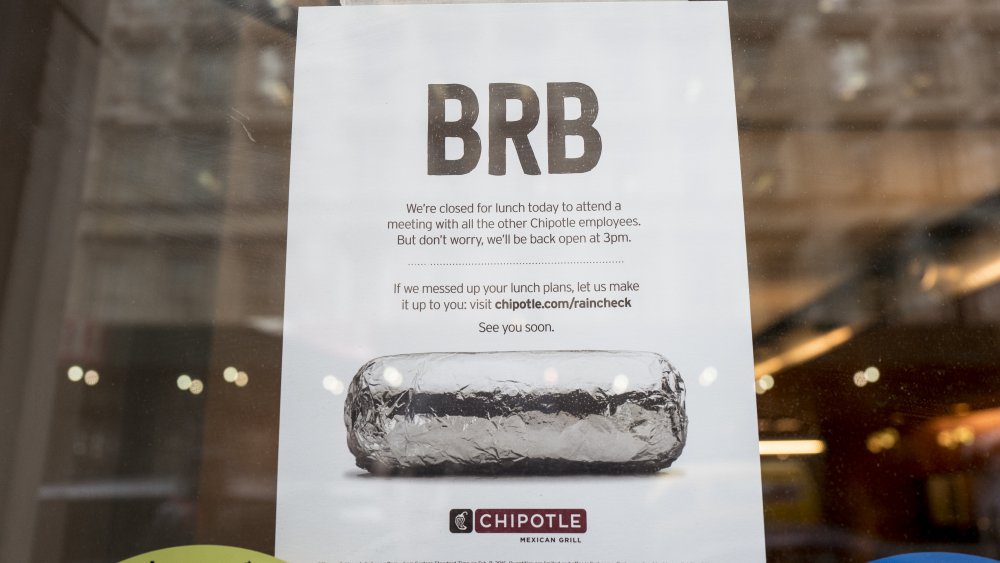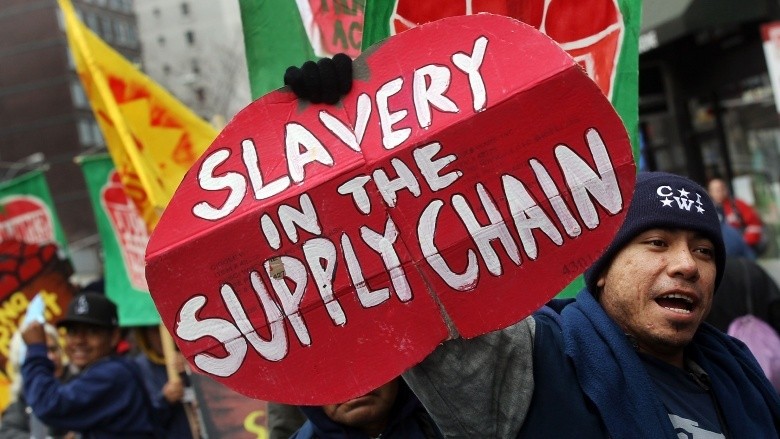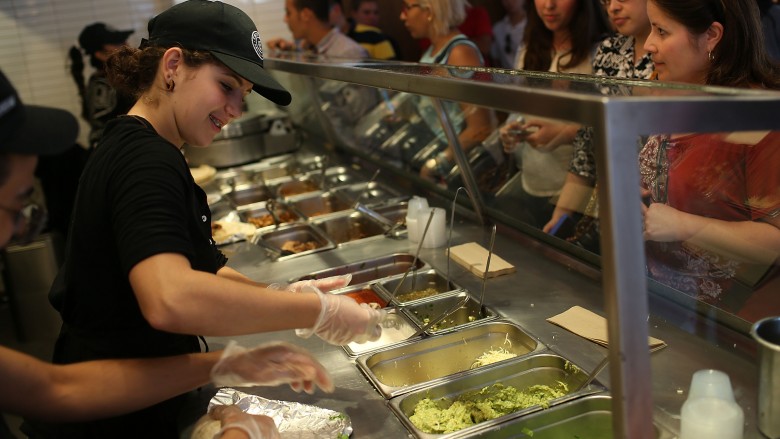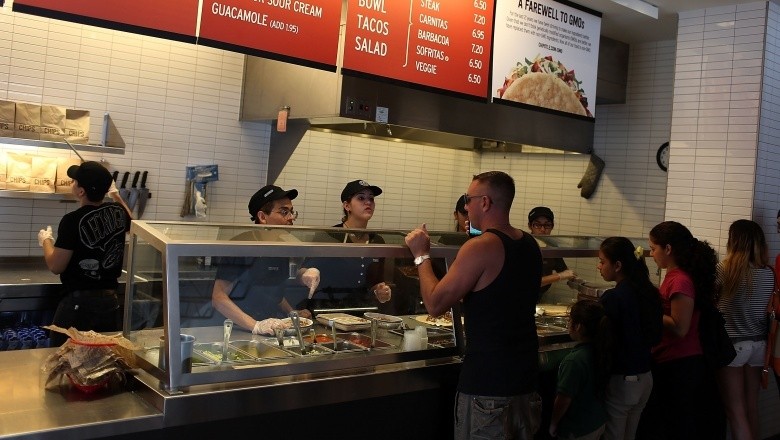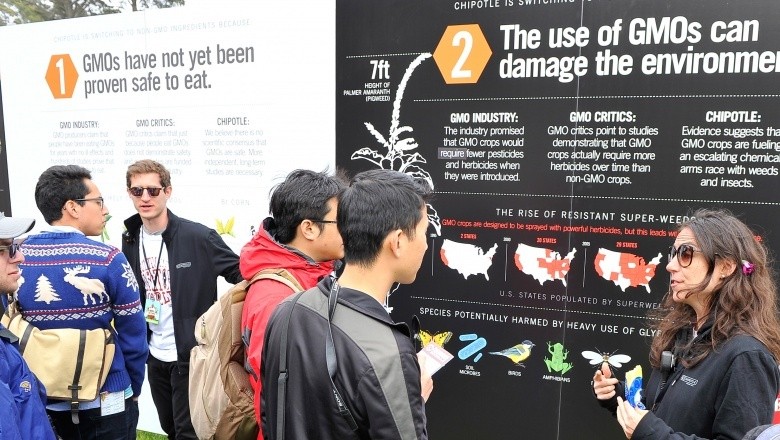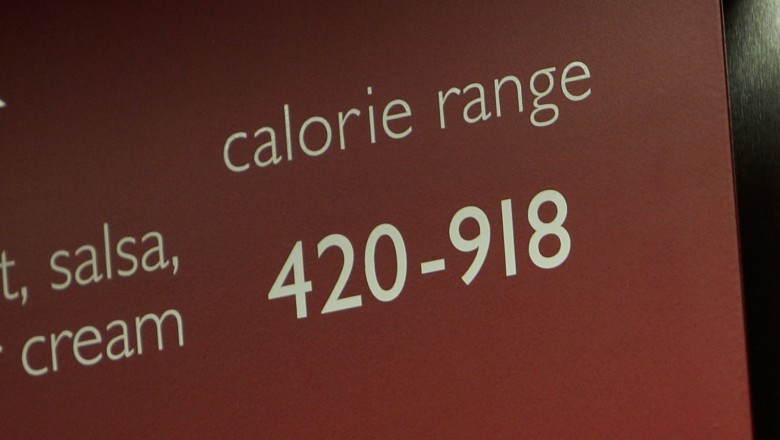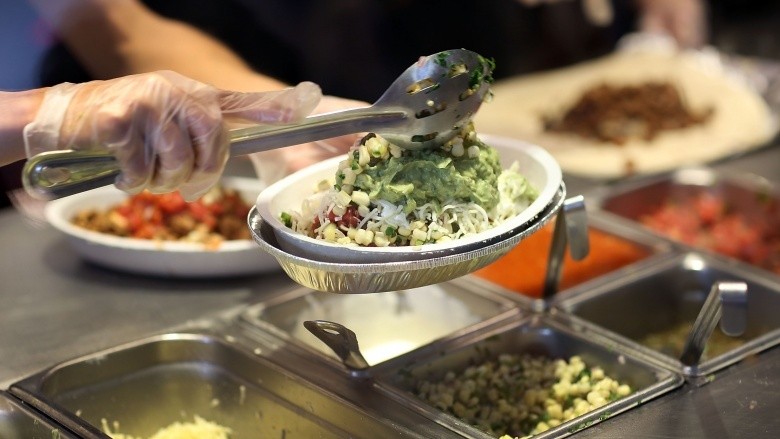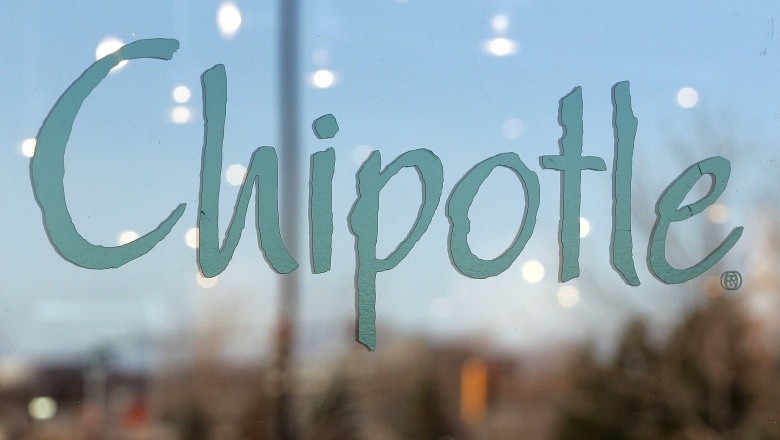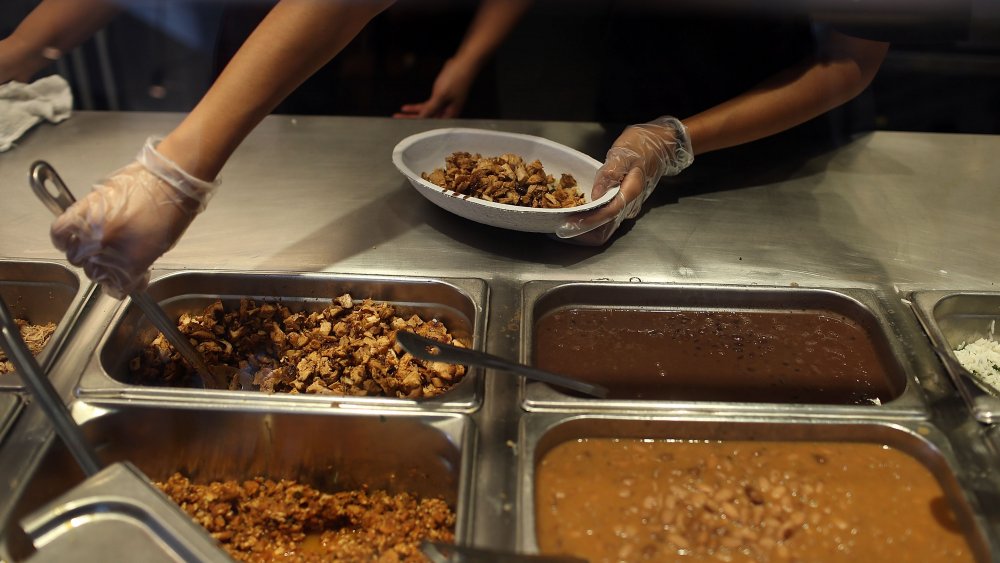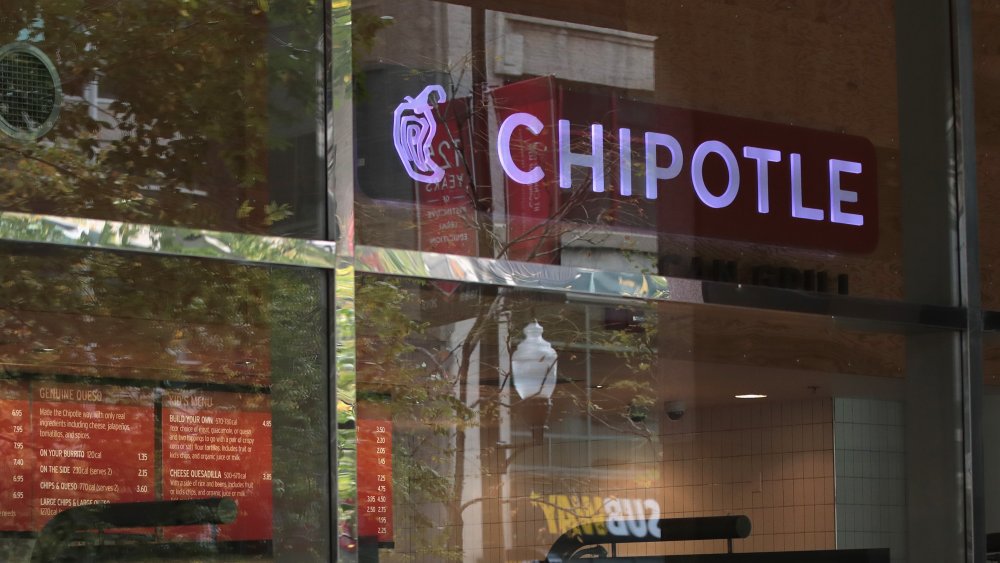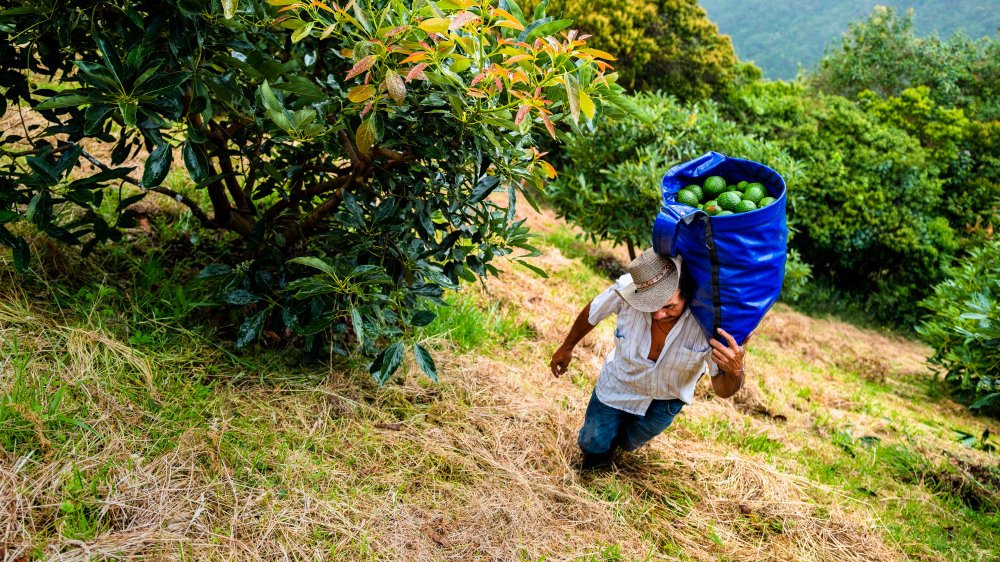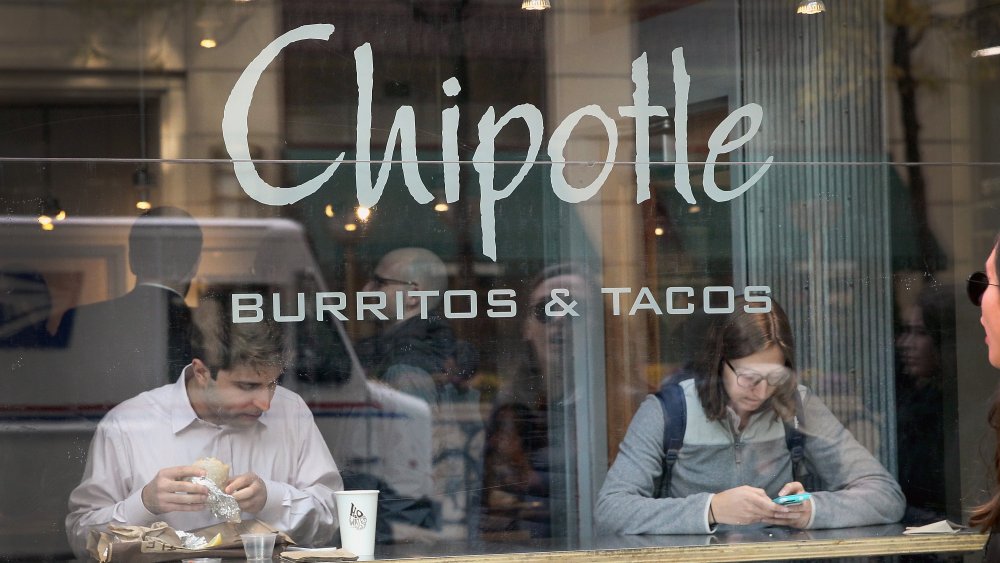Secrets Chipotle Doesn't Want You To Know
At a glance, it seems like Chipotle checks all the boxes. It's fresh, it's made to order, customers get to pick exactly what they want from a wide range of delicious ingredients, and as far as quick and affordable lunches, it's a lot healthier than most other options (as long as you choose wisely). It's no wonder the chain is such a hit!
But do some digging, and you'll find that Chipotle has some skeletons in their closet. Like... a lot of skeletons. From shady business practices, to lawsuits, to the large-scale impacts of some of your favorite products, Chipotle doesn't entirely live up to the ultra-healthy, super-friendly image that they're trying to project. Oh, and even if you only keep one eye on the social media news cycle, you've undoubtedly heard mumblings about their food poisoning outbreaks. Spoiler alert: it's way, way worse than you thought.
If you're the type that wants to have all the information on the chains your hard-earned dollars are going to support, you should know about all of these secrets that Chipotle hopes you don't find out about.
Chipotle's design is minimalist because it's all they could afford
Chipotle is often praised for the minimalist chic of its design, where spare but considered interior architecture mimics spare but considered ingredients. Though that makes a great story for the magazines, it's actually just a load of rubbish.
When Steve Ells opened his first restaurant in 1993, he did it with minimal funding, so he wasn't in a position to splurge on interior designers. Instead he went to a local hardware store and cobbled together whatever he could from what he found there. Luckily for him, the spare industrial aesthetic never seems to go out of style for the burrito-craving demographic, and now other chains appear eager to recreate the success.
Unfortunately, since desperately doing the best you can with a limited budget is not a commonly recognized interior design process, they may end up paying quite a lot for a bad copy of cheap.
Chipotle was sued by a disabled man
The interior design might be impressing design critics, but you can bet they all have full use of their legs. Because for those people who have to order while sitting in a chair, the perspective might be just a little different. At least it was for San Diego man Maurizio Antoninetti, who sued Chipotle for violating the rights of the disabled.
Mr Antoninetti was unhappy that when he ordered his food from his wheelchair, the wall in front of the counter was too high for him to see over and he was unable to choose ingredients for his order or see his food being made. Bizarrely, although Chipotle spent thousands of dollars fighting the accusations in court, and in the process forced Mr. Antoninetti to tally up $550,000 in legal fees, the restaurant nevertheless went ahead and quietly retrofitted the offending restaurants with lower walls. And that was years before the verdict even came back.
No one likes to admit when they're wrong, but fighting an unnecessary lawsuit for five years to avoid it has to be a record of some sort.
Chipotle left Latino voices out of its marketing
You might be forgiven for thinking that a restaurant called Chipotle Mexican Grill would be interested in promoting Mexican or Latino culture, but some events might suggest otherwise.
In 2014, Chipotle decided to bring some literary flavor to the dining experience they provide and commissioned 10 writers and creatives to produce new works that would grace Chipotle's bags and cups. So far, so good! Just bringing a little cultural enlightenment to the indigestion-riddled lunch break of an unhappy office worker. What else would you need? How about even a single Mexican or Latino writer?
For a restaurant making a fortune by imitating Mexican cuisine, you'd think hiring Mexican artists to participate in a promotional campaign would be a no-brainer. But it seems Chipotle only cares about the parts of Mexican culture people want to shove in their faces, and the "Mexican" branding is just a mask to promote that. Chipotle is to Mexico what Disney's Magic Kingdom is to reality.
Chipotle was sued for wage theft
In order to turn a profit, a company has to make more money than it spends. One of the biggest expenses for companies like Chipotle is the wage bill, but thanks to minimum wage laws there isn't much that can be done to reduce that ... you would think.
Not so for Chipotle, according to almost 10,000 employees across the USA, who have joined a lawsuit that is claiming Chipotle is guilty of wage theft. The accusation states that managers at Chipotle restaurants would require workers who were working the closing shift to clock out at a certain time, but then continue working unpaid until they were given permission to leave. In fact at many of the company's restaurants, the process is automated, with workers being automatically clocked out at a set time whether or not they're finished working.
Chipotle denies the allegations, claiming the problem lies with a few managers who don't follow policy. No matter what Chipotle might claim its policy to be, with this many complaints surfacing it's a good time to remember that actions speak louder than words.
Chipotle is keeping your change
If you've ever spent a few months throwing your extra change into a jar then doing something fun with the resulting cash, you know that it adds up pretty quickly. When all that spare change is coming from the number of people Chipotle has as customers, well, you can imagine they'd make a fortune keeping all that loose change they're supposed to give back to customers.
And that's exactly what one lawsuit, filed in 2020, claims. According to KDKA of Pittsburgh (via Fox News), the state attorney general's office has received numerous complaints of Chipotle locations that have stopped giving customers their proper change back. For example, one customer says that when her bill came to $15.51, she was given $4 change from her $20. Another said they had a bill of $8.72, paid with a $20, and got $11 back.
Attorneys on the side of surprised customers say that they found this was a "top-down directive from the corporation," and that the excuse is likely a coin shortage related to the pandemic. But attorney Frank Salpietro added, "I understand that the pandemic is affecting all of us, but that doesn't give Chipotle the license to line its own pockets at the expense of consumers [...]"
As for Chipotle, they gave no immediate response to the accusations.
Chipotle occasionally has terrible guac
Chipotle has always made a big deal about their guac, and that makes it even more noticeable when it suddenly becomes less-than-appetizing. It was the end of 2019 when customers started complaining: the guac they were getting served was brown, stringy, and pretty nasty — the kind of nasty that made people wonder why Chipotle locations were still serving up the stuff.
According to Vice, some locations did stop serving it, and the problem was even bigger than originally thought. Social media was filled with images of people pulling entire sections of unripe avocado out of their bowls and burritos. The worst thing is, Chipotle said (via Business Insider) that it was pretty much normal.
What happened, they said, was an annual switch in avocado suppliers. With Mexican avocados being in season between November and April, it's Peruvian avocados that fill in those summer months. Chipotle's chief communications officer, Laurie Schalow, said, "Due to the seasonal transition from Peruvian to Mexican supplies that happens every year at this time, we are experiencing normal variabilities in our avocados [...]"
Normal? Every year? Customers didn't think so, but if you were one who got brown guac, now you know when to give Chipotle a miss.
Chipotle... with a side of food poisoning
Chipotle has had an almost unthinkable relationship with food poisoning. Back at the end of 2015, Food Safety News did an overview of the five outbreaks they'd had since July. More than 350 people reported getting food poisoning after eating at Chipotle, and cases happened in at least 11 different states.
Fast forward a bit, and in 2017, Business Insider reported on the closure of a Virginia Chipotle after multiple customers reported they'd gotten food poisoning after eating there.
And... in 2018, they were back in the news again: Becker's Hospital Review was reporting on an Ohio Chipotle that was linked to around "700 cases of unidentified foodborne illness," and was ultimately the target of lawsuits filed by customers that needed to be hospitalized.
Chipotle's food poisoning woes have added up to a lot of pain and suffering... that they're literally paying for. In April 2020, ABC News reported that Chipotle had agreed to settle criminal charges against them by paying a whopping $25 million fine. That covered the fallout for more than 1,100 food poisoning cases spanning 2015 to 2018, and the settlement also involved Chipotle admitting "poor safety practices" — like not keeping food at the proper temperatures — were to blame for the string of outbreaks. The report also noted that Chipotle has also spent "tens of millions of dollars" upgrading food safety equipment.
Chipotle dumped its local suppliers after food safety issues
Hordes of vomiting customers and the value of the company's stock are not the only victims of the foodborne illness scandal that first hit Chipotle in 2015. The collection of small-scale "local" producers the company has made so much advertising mileage on can now be added to that list.
By buying a portion of its ingredients from local sources, Chipotle sought to gain from the growing "locavore" movement that espoused locally sourced food over well-traveled food. Unfortunately that decision was a double-edged sword for Chipotle given that smaller producers have a harder time meeting the company's new food safety requirements and may have been a contributing factor in the various outbreaks that plagued Chipotle locations across the country.
In an attempt to get a better grip on food safety, Chipotle ditched a bunch of its smaller suppliers in late 2015 and moved to centralize some of its food preparation activities to gain more control. However by creating a very public stain on the face of the local food movement, Chipotle hasn't just damaged the suppliers it's dumped. Because other chains will now think twice before going local, they have also thrown a huge tortilla-wrapped wrench into the future of the whole industry.
Chipotle hasn't always lived up to its company motto
If, for some reason, you need further evidence that Chipotle doesn't really give a hoot about Latino immigrants or low-wage employees, look no further than its battle with the Coalition of Immokalee Workers (CIW). While Chipotle appears to make great efforts to get meat from ethically raised animals and find local sources for its ingredients, when it comes to the workers who actually harvest the food Chipotle buys, Chipotle's efforts fall a little short of exemplary. For years, the CIW tried to get Chipotle to sign its Fair Food Program in support of Florida's tomato pickers. The program would require them to pay an additional penny per pound of tomatoes to provide a wage increase and ensure they only buy from growers who follow a code of conduct that supports workers' rights.
Unfortunately, even though McDonald's and Taco Bell didn't take long to sign up and despite ongoing protests and campaigns, Chipotle held out. The agreement was eventually signed in 2012, accompanied by great fanfare on the part of Chipotle (which is never slow to celebrate evidence of its "integrity," no matter how long it takes to arrive).
But in the time it took for Chipotle to get with the program, thousands of seasonal workers were left to struggle: working long shifts for extremely low wages and living in expensive but rundown slum housing.
Chipotle paid out $8 million after manager sexually assaulted teenage employee
Working in foodservice is not an uncommon first step on the career ladder for young people, and it can often provide useful experiences and training that will impact the rest of their working lives. Unfortunately for one 16-year-old in Houston, her on-the-job-training contained extra things she definitely didn't need. Just weeks after starting her new job, a 26-year-old supervisor started making moves, bumping into her frequently, and making comments about her body. Pretty soon, that led to the supervisor having unprotected intercourse with the underage teenager on a regular basis, including behind the restaurant dumpster, in the restroom, and in a nearby park.
The victim's mother reportedly tried to intervene by going to the restaurant manager, but instead of jumping to the defense of a vulnerable employee, he did nothing and is even accused of trying to cover it up and discouraging the mother from going to the police. And when it came to the trial, Chipotle did no better. Instead of accepting the guilt of its employee, Chipotle tried to frame the criminal activity as a consensual relationship. But since a 16-year-old cannot legally consent in Texas, it only took the jury a few hours to decide in the victim's favor and award her a payout from Chipotle of nearly $8 million. The actual perpetrator was not present for the court case, having long since fled to Mexico to avoid trial.
Chipotle dabbled with illegal workers in Minnesota
In a confusing and bizarre sequence of events in Minnesota in 2010, it was revealed that Chipotle was employing hundreds of illegal workers.
When the controversy came to light during an audit by U.S. Immigration and Customs Enforcement, 450 workers, comprising more than a third of Chipotle's Minnesota workforce, were promptly fired. According to a report by Reuters, there was evidence that managers in Chipotle restaurants were fully aware of the illegal status of at least some of those employees. However, the company made no effort to address them until an audit came around, at which point the workers were immediately ditched.
The results of the Minnesota audit inspired additional audits of Chipotle's D.C. and Virginia operations, which resulted in more employees being cut loose.
Chipotle has been accused of fearmongering for profit
In the face of constant corporate self-promotion and sales hype, it can be hard to distinguish accepted reality from convenient untruths. Restaurants will say whatever they can get away with if it helps them sell more food, and Chipotle is as guilty of this as any of them, according to the Washington Post.
In late April 2015, Chipotle announced that its entire menu would be GMO-free. This might seem like an insignificant declaration, but when GMOs are a scientifically supported path toward sustainably feeding a growing world population, casually throwing a wrench in the works is an ethically questionable act, to put it mildly. As the Post points out, Chipotle was engaging in baseless negative propaganda against GMOs in the pursuit of profit.
With all the misinformation about GMOs flying around, Chipotle can neatly attach its fearmongering marketing ploy onto the back of its standard (and oft-repeated) elevator pitch about food ethics and sustainability. But the truth is that without the continued use and development of GMOs, there's no sustainable way to prevent a lot of people dying from hunger in the not-very-distant future. But millions of deaths from hunger don't count as a loss in the end-of-year financial figures, so there's really no reason for Chipotle to care.
Chipotle was sued for false advertising over 300-calorie chorizo burrito claim
In 2016 Chipotle tried to recover its flagging popularity by introducing the first new ingredient since 2014: chorizo. So far so good, right? Everyone loves a bit of spicy chorizo. Unfortunately alongside the "toasted cumin, chipotle peppers, and three types of paprika" put into the new temptation, Chipotle also added a generous handful of "meh," and a surprising amount of coarse ground lies. Or that's what's being claimed in a recent lawsuit.
That's because in Chipotle's in-store advertising appeared to claim that a burrito made with the new ingredient would contain just 300 calories. Unfortunately, if you total up the proposed ingredients using Chipotle's own calculator, the actual number comes out at 1,055 calories. Chipotle responded to customers on Twitter with a half-baked sorry/not sorry response, saying the claimed 300 calories was for just the chorizo and nothing else, and that the banner was unintentionally confusing. If that's true then Chipotle has some serious quality control issues in its design department, and someone definitely should have been fired.
Chipotle was created to fund another restaurant
Chipotle founder Steve Ells has quite the cuisine credentials. When he graduated from a pretty impressive food school (the Culinary Institute of America) he looked all set to carve new roads in the American fine dining scene — but that's an expensive road to go down. Then he opens a fast food ... sorry, a "fast casual" restaurant, that serves burritos to hungry students and hipsters. So what went wrong? Nothing actually. It was all part of the plan. Except the part Chipotle was supposed to play was taking money off hungry students and funneling it into Ells' next project, a fine dining restaurant.
The fine dining part never happened, but the money part is working beautifully. Ells no longer has any interest in opening a fine dining restaurant, and you can't really blame him. When the cheap nag you bought to get from A to B turns out to be a cash cow instead, why would you keep riding?
McDonald's owned 90 percent of Chipotle but sold it off
Chipotle has worked hard to set itself apart from more "traditional" fast food restaurants. It constantly plays the ethical card, keeps its menu simple, and doesn't do drive-thrus or breakfast. But if it wasn't for fast food, specifically McDonald's, Chipotle probably wouldn't be the corporate success it is today.
Not very long ago, McDonald's owned as much as 90 percent of Chipotle, and invested around $340 million in the restaurant between 1998 and 2005. This enabled Chipotle to grow from around 14 locations in 1998, to almost 500 when McDonald's decided to call time on the relationship in 2006, having decided that Chipotle was distracting attention from its core brand.
Unfortunately for McDonald's, Chipotle continued to grow and the decision to part ways ended up costing them a colossal amount of money. And although Chipotle's decision to accept investment from the golden arches helped it achieve astonishing growth, it also revealed the price of their ethics. Chipotle might claim to hold the ethical high ground, but if you have a giant wad of cash to invest, it won't expect you to join them up there.
Chipotle was accused of nearly 14,000 cases of violating child labor laws
In early 2020, Chipotle agreed to pay out $1.3 million after being accused of "'routinely' violating child labor laws," says CNN. The accusations were centered around Chipotle locations in Massachusetts, and the chain was accused of forcing teenage employees under the age of 18 to work late nights, and more hours per day and week than is legally allowed.
The investigation into the chain's child labor practices took three years, and was kicked off by one 2016 complaint from a parent who called the state's attorney general's office after the child was kept at work until after midnight. The investigation confirmed that it was far from the only instance of labor abuses happening, and along with the announcement of the fine, Attorney General Maura Healey noted: "We hope these citations send a message to other fast food chains and restaurants that they cannot violate our child labor laws and put young people at risk."
The penalty was the largest child labor-related fine in state history, and in addition to the fine, Chipotle also paid out $500,000 for youth programs designed to teach minors about the labor laws in place to protect them.
A wrongful termination suit cost Chipotle millions
In 2015, one Chipotle location made a massive mistake that cost them a fortune.
Jeanette Ortiz had worked for the company for 14 years when one day, her location had an extra $636. She alerted corporate, put the money in the safe, and it sat there for a while. A few months later, she alerted them to the fact that the money was now missing.
When another manager was brought in to review security camera footage, they claimed they saw Ortiz put the money in her backpack and leave. Ortiz was fired, but denied the charges and took Chipotle to court.
According to The Washington Post, this is where things started to unravel for Chiptole. There was no surveillance footage — they claimed they had recorded over it — and they had initially refused to show it to anyone else. Text messages and documentation around her firing had also disappeared, and Ortiz pointed out that between the discovery of the money and its disappearance, she had filed a workers' compensation claim for her carpal tunnel, and she was up for a promotion that would have increased her salary by $28,000 per year.
Given her stellar track record before the firing, the lack of evidence, and the difficulty she had finding another job, it's not entirely surprising that she was awarded nearly $8 million, and ultimately settled for a confidential, final sum.
Chipotle is hoping you don't question their avocado use
Do you think twice about getting that guac at Chipotle? They're hoping you don't, because the big picture is kind of terrifying.
According to USA Today, Chipotle serves around 50 million pounds of guac every year. Each day, they use more than 450,000 avocados, and that's hard to wrap your head around — especially when you consider that avocados are pretty terrible, not for us, but for the planet.
Vice looked at the problem of avocados, and there's a lot to unpack here. For starters, many of the places avocados grow — like Mexico, Peru, California, and Chile, where Chipotle gets their avocados — are regions that constantly labor under water shortages. Given that avocados require about twice the amount of water as a crop like oranges, and that's a huge strain.
Skyrocketing demand for avocados has also been linked to deforestation and environmental degradation. According to You Matter, the vast acreage devoted to avocados are called monoculture plantations. That means they're constantly growing just one crop, and without crop rotations, that means greater need for fertilizers and pesticides... which bring a whole new host of problems with them.
And one more thing: large-scale avocado production has attracted the attention of Mexican cartels, who have gotten in on the avocado industry by demanding part of the profits as "protection money." Chipotle probably hopes you don't know that's where some of your money is ending up.
Chipotle might use photos of people without their consent
In 2017, Chipotle was sued for $2.2 billion... and while that seems like an outrageous amount, the offense was one that the plaintiff wanted people to take notice of.
According to Leah Caldwell (via The Denver Post), she had been eating in a Denver Chipotle restaurant in 2006. When she left, she was approached by a photographer, who asked her to sign a release form allowing them to use her image in promotional materials. She declined.
Fast forward to 2014, when Caldwell walked into another Chipotle, this one in Florida. There, on the wall, was her picture. Then, in 2015, she found her photo in two more California locations. Her image had been heavily edited, and she took them to court, arguing that the restaurant had used her image for commercial gain, and violated her "reasonable expectation of privacy."
Legal Newsline later reported that she ultimately settled for an undisclosed sum, and the case was dismissed. Chipotle did not comment.
